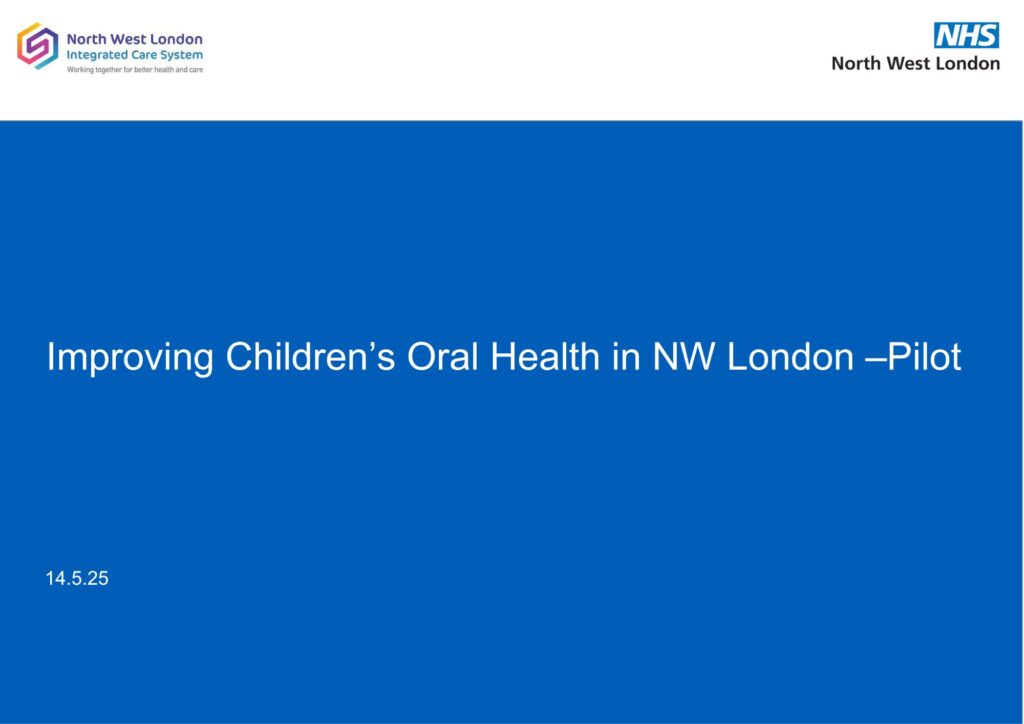On Wednesday 14 May the North West London LDC held a meeting for all members in north west London, welcoming Julie Sands, Assistant Director, Primary Care Contracting and Transformation Primary Care NHS North West London, to the meeting to discuss the plans for two new dental pilots set to start this year.
Julie provided an overview of the two pilots being finalised. The first is a two year long children’s oral health pilot which has secured funding of £1.6 million, and a shorter inclusion health pilot which would run for between three and six months, with a budget of £300,000.
The focus on children’s oral health is because north west London continues to face significant issues in this area, with some areas having among the highest rates of children’s tooth decay in London. The pilot aims to find effective ways to improve children’s access to dental care, treatment, assessments, and advice, involving families to enhance or maintain good oral health.
There are shared responsibilities between the NHS and local authorities for children’s oral health, with local authorities having responsibility for oral health promotion programmes. Funding is variable across boroughs so a sustained and partnership approach to improving children’s oral health is considered important. Because of the variation, local authorities are collaborating on a core, affordable offer. A key part of the pilot offer to participating dental practices will be training support (non-clinical primarily, but potentially some clinical aspects) to help them deliver the service effectively. This training will be developed in consultation with dental public health experts.

The pilot aims to target children and young people (and their families) in the Core 20 + 5 areas identified by NHS England as priority areas to reduce health inequalities and improve health outcomes. These are the most deprived areas of a borough, where data also indicates low access and high needs. The pilot will also engage with different communities to understand barriers to access and to address any misinformation about NHS dental services. Engagement will be holistic, taking in other general health promotion measures such as diet and exercise.
There was a gratifying acknowledgement of the flaws and restrictions of the current contract. The pilot would aim to address some of the flaws by essentially buying additional time from practices through enhanced UDAs for targeted populations. The pilot will not be open to all practices but rather practices which are considered to be best able to serve the identified Core 20 + 5 areas will be invited to participate. This approach is being taken to ensure that the pilot meets the needs of the identified populations.
Practices involved in the pilot will be the primary recipients of patients signposted from children’s hubs, family hubs, and other community venues. They will provide oral health promotion in partnership with these services. Establishing clear referral pathways into and out of the service will be crucial, including referrals to specialist services (CDS) or for additional services like diet and weight management. Practices will need information on these external services and how to signpost patients effectively to ensure the right individuals are accessing the pilot. Participation in the evaluation of the pilot will also be a key requirement
The exact age range for intervention was also yet to be specified, if it would just be young children or all children. There was a recognition of some of the difficulties that may be faced, such as missed appointments which enhanced UDAs would not compensate for. In addition, the enhanced UDAs had also not yet been agreed and may be an agreed flat cash rate or percentage increase. Julie will be meeting with the LDC Board to discuss this and other issues in more detail.
The slides from the meeting are available above and here.
